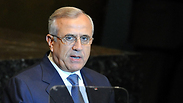
Outgoing Lebanese President Michel Suleiman
צילום: EPA
Lebanon enters presidential vacuum as Suleiman finishes term
Hezbollah boycotts Lebanese president's farwell speech, in which he said terrorist group must stop its role in Syrian conflict.
Outgoing Lebanese President Michel Suleiman said on Saturday that dialogue was the only way to overcome deep divisions in the country, which is struggling to cope with political and security spillover from Syria's civil war.
Suleiman made his remarks during his farewell speech hours before his six-year term ends and two days after parliament failed for the fifth time to choose a successor. The impasse highlights the stark political divisions in the country.
With his departure, Lebanon enters a presidential vacancy with no clear sign when it will end.
"We overcame difficult circumstances, (hence) my call for sustained dialogue which is the only guarantor for solving dilemmas," he told the audience, which included former Lebanese presidents and prime ministers.
Suleiman's powers will pass to Prime Minister Tammam Salam's government, which is also supposed to prepare for a parliamentary election later this year.
Suleiman also reiterated his call for the powerful Lebanese Shi'ite group Hezbollah to pull its fighters out of Syria to preserve national unity, and Hezbollah politicians boycotted Saturday's ceremony at the presidential palace in a show of anger toward Suleiman.
"We know that we are not isolated from our surroundings… but national unity should push us against interfering in the neighboring countries’ affairs, and compel us to withdraw from anything that separates us,” he said in a reference to Hezbollah’s engagement in the Syrian war.
Lebanon is deeply divided along sectarian lines between Lebanon's two main political blocs - the Hezbollah-led March 8 coalition which supports Syrian President Bashar Assad, and the rival March 14 camp which backs Assad's opponents.
The two blocs were formed as a result of divisions in the country after the assassination of former Prime Minister Rafik al-Hariri in 2005. March 14 accused Syria and Hezbollah of responsibility, a charge they deny.
Tensions between the two blocs have led to street fighting in many areas in Lebanon including the capital and at one point put the country on the brink of civil war.
Suleiman, a former army general, was chosen in 2008 as a consensus president in a deal which ended one of the worst bouts of street fighting since 1990, when fighters from Hezbollah and Amal movement fought with March 14 supporters.
He later fell out with Hezbollah and its allies after he criticized the group's role in Syria and called for it to withdrew its fighters back to Lebanon.
Hezbollah, its allies including Christian ally Michel Aoun and the head of Amal movement Speaker of Parliament Nabih Berri did not attend the ceremony.
Lebanon's presidency, allocated to the Maronite Christian community under Lebanon's sectarian division of power, is one of the three main political offices alongside the prime minister - a Sunni Muslim - and parliamentary speaker - a Shiite.
The power of the presidency, once the leading political office in Lebanon, was eroded under the accord which ended Lebanon's civil war, handing greater influence to the government and prime minister.
Salam took a year to find support for the government he formed in March, while parliamentary elections which were due last summer were postponed until this November, stymied by the same standoff holding up the choice of new president.
With no agreement in sight, some Lebanese fear that even parliamentary elections could be postponed, but Suleiman called on the parliament to swiftly pass an electoral law and avoid any delay in holding the vote.
Reuters and the Associated Press contributed to this report










